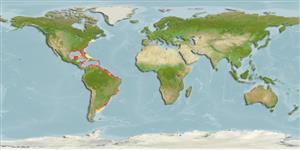Environment: milieu / climate zone / depth range / distribution range
Ecology
Marine; brackish; demersal; depth range 1 - 53 m (Ref. 9710). Subtropical; 46°N - 45°S, 98°W - 33°W
Western Atlantic: Canada (Ref. 5951) to Maine to Florida, USA (possibly from Nova Scotia, Canada), along coasts of central and south America (Ref. 26938) to Uruguay, including Bermuda and Gulf of Mexico (Ref. 9626). Rare in Greater Antilles (Ref. 26938).
Size / Weight / Age
Maturity: Lm ? range ? - ? cm
Max length : 48.3 cm TL male/unsexed; (Ref. 9626); common length : 35.0 cm TL male/unsexed; (Ref. 5217); max. published weight: 2.1 kg (Ref. 40637)
Adults are found in shallow coastal waters, usually over hard or sandy bottoms. Juveniles may be encountered in estuarine areas (Ref. 9626) and off sandy beaches (Ref. 5217). Found in schools, but may be encountered in small groups or in pairs (Ref. 26235). Adults feed on small crabs, shrimps, fishes, and worms. Flesh has excellent flavor (Ref. 5521). Marketed fresh (Ref. 9710).
Life cycle and mating behavior
Maturity | Reproduction | Spawning | Eggs | Fecundity | Larvae
Robins, C.R. and G.C. Ray, 1986. A field guide to Atlantic coast fishes of North America. Houghton Mifflin Company, Boston, U.S.A. 354 p. (Ref. 7251)
IUCN Red List Status (Ref. 130435: Version 2024-1)
Threat to humans
Reports of ciguatera poisoning (Ref. 30911)
Human uses
Fisheries: minor commercial; gamefish: yes; aquarium: public aquariums
Tools
Special reports
Download XML
Internet sources
Estimates based on models
Preferred temperature (Ref.
123201): 11.8 - 27.9, mean 24.2 °C (based on 648 cells).
Phylogenetic diversity index (Ref.
82804): PD
50 = 0.5039 [Uniqueness, from 0.5 = low to 2.0 = high].
Bayesian length-weight: a=0.01288 (0.01148 - 0.01446), b=2.95 (2.92 - 2.98), in cm total length, based on LWR estimates for this species (Ref.
93245).
Trophic level (Ref.
69278): 4.3 ±0.4 se; based on diet studies.
Resilience (Ref.
120179): Medium, minimum population doubling time 1.4 - 4.4 years (Preliminary K or Fecundity.).
Fishing Vulnerability (Ref.
59153): Moderate vulnerability (38 of 100).
Nutrients (Ref.
124155): Calcium = 98.3 [55.1, 209.5] mg/100g; Iron = 1.33 [0.75, 2.58] mg/100g; Protein = 19.2 [17.4, 21.5] %; Omega3 = 0.43 [0.26, 0.73] g/100g; Selenium = 22 [12, 45] μg/100g; VitaminA = 10 [3, 30] μg/100g; Zinc = 0.709 [0.507, 1.020] mg/100g (wet weight); based on
nutrient studies.
